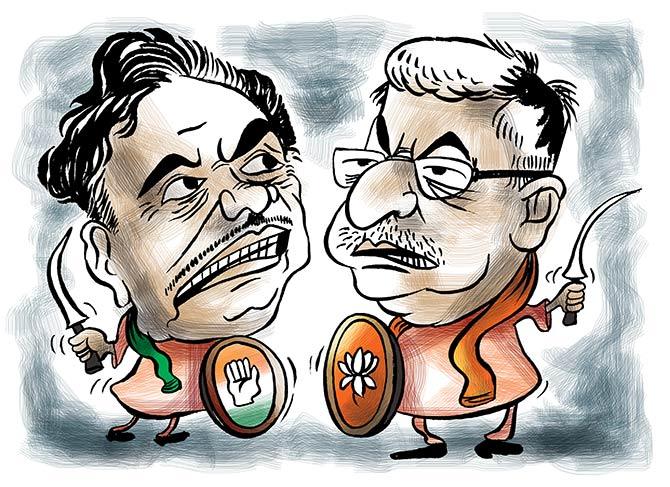Nowhere else has caste, power politics, and generational change come together to form a combination so potent that it is combustible.
Aditi Phadnis reports.

Mr X was insistent. "Please don't use my name," he begged. "Raviya hamara dost hai," he said lapsing into Hindi in his anxiety "and you can't be a Kayastha in Patna and not know R K Sinha -- or Shatrughan Sinha, for that matter". This report is based on his analysis.
Patna Sahib is going to be one of India's most interesting contests: Because nowhere else has caste, power politics, and generational change come together to form a combination so potent that it is combustible.
R K Sinha is a venerable and respected pillar of Patna's prabuddha (intellectual elite) population.
A journalist to begin with, he is self-made and has been the backbone of Rashtriya Swayamsevak Sangh activities in Bihar for several decades.
In Bihar, the upper castes used to be with the Congress.
In fact, the winning combination for the Congress used to be an amalgam of upper castes, especially Kayasthas (dating back to the days of Rajendra Prasad, Sachidanand Sinha and Mahamaya Prasad Sinha) and the Dalits.
This changed with the Emergency when another Kayastha -- Jayaprakash Narayan -- challenged the Congress's caste hegemony.
More, he was able to create a new social combination, inviting the intermediate castes to the amalgam on the back of a promise of their empowerment.
The rise of figures like Lalu Prasad led the Kayasthas to look for leadership elsewhere: And when the rath yatra led by the face of anti-Congressism, L K Advani, hit Bihar, the Kayasthas moved to the Bharatiya Janata Party en masse.
Shatrughan Sinha was the recipient of this bounty. He is not an inconsiderable figure in the politics of Patna and is considered the local boy who made good but returned to his roots.
Then there's Ravi Shankar Prasad. The son of the Jana Sangh/BJP president of the Bihar unit in the 1970s-1980s, Thakur Prasad, Ravi Shankar is the illustrious son of a well known father.
The father rose to be a minister in the Karpoori Thakur government. Ravishankar took an opposite position and along with friend Sushil Kumar Modi, fought the legal case against Lalu Prasad's complicity in the fodder scam.
He is certainly not a newbie in politics, but is generally considered a non resident Bihari.
Patna is a place where everyone knows everyone. R K Sinha's son Rituraj worked in the BJP's 2015 assembly election campaign, leading the war room.
There is no Kayastha function in Bihar and eastern Uttar Pradesh that R K Sinha does not attend or finance.
He has organised self help groups, his Chitragupt Sabha does a lot of charity work all over north India.
He raised his voice publicly in 2012 about the denial of a place to a Kayastha in the Janata Dal United-BJP government in Bihar.
He is the ultimate liberal at heart, a great votary of a free press. He never shirks from telling the truth: Whether people like it or not.
Backed by an assurance from the RSS, Sinha put in a bid to contest the Lok Sabha election.
Deputy Chief Minister Sushil Kumar Modi ascertained the views of MLAs from the constituency.
All but Nawal Kishore Yadav, the new entrant into the BJP (he crossed over from the Rashtriya Janata Dal some months ago and was made a minister) supported Sinha's claim.
When the BJP central election committee met, it was clear that Shatrughan Sinha would not be given the BJP nomination.
R K Sinha was generally considered a shoo in. Instead, Ravi Shankar Prasad was named the candidate although he still has four-and-a-half years of his Rajya Sabha term left.
Supporters of the two leaders clashed at the airport. It was both unseemly and ugly.
Recognising that R K Sinha was hurt, Arun Jaitley called him to assuage his feelings and seek his support for Prasad. It was too late.
Now, Mr X says, it will be touch-and-go for Ravi Shankar Prasad. The Kayastha vote will be split.
And if Shatrughan Sinha can attract some Yadav votes (which Ravi Shankar cannot) and some Muslim votes (which will not go to the BJP any way) it will not be easy for Prasad to win: Unless he can make up with R K Sinha. That's not happening.
Mr X's personal, private opinion is that the move addresses a post May 23 situation: The Modi-Shah combine doesn't want independent-minded MPs, least of all MPs who can pick up the phone and speak to the RSS's top leadership. They also want a generational change.
The outcome in Patna Sahib will decide what is more important: The Modi-Shah hegemony or winning the seat.











